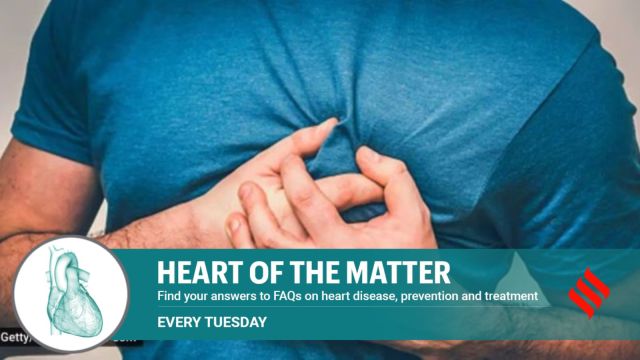Bengaluru doctor, 58, could not sense heart attack despite experiencing signs over six hours before: Why we overlook signs
A stuttering heart attack is characterised by a pattern of recurrent, fluctuating symptoms that can precede a major heart attack
 The arteries in his heart had a blockage of 95 per cent and he required stenting, a procedure to open up blocked channels and restore blood flow.
The arteries in his heart had a blockage of 95 per cent and he required stenting, a procedure to open up blocked channels and restore blood flow.Not only commoners but even doctors make the mistake of ignoring some signs of a heart attack. A 58-year-old colleague of mine had a habit of waking up at 4.30 am, beginning his day with yoga. He experienced some discomfort and ignored his session, attributing it to general tiredness and work stress. At 10 am, he experienced chest heaviness of five to ten minutes, with very mild sweating, which he attributed to gas as a result of his breakfast and not exercising in the morning. At 12.30 pm, he had pronounced symptoms of persistent pain and profuse sweating. He took a rickshaw and went to the nearest hospital. The arteries in his heart had a blockage of 95 per cent and he required stenting, a procedure to open up blocked channels and restore blood flow.
What many do not realise is that sometimes symptoms of a heart attack may come in waves and at intervals. Sometimes the initial symptoms are just 10 per cent, which are what people tend to neglect as related to indigestion, physical stress or a blood pressure issue. This is what we call a stuttering heart attack, characterised by a pattern of recurrent, fluctuating symptoms that can precede a major heart attack. It occurs when a blockage in the coronary artery blockage intermittently opens and closes, allowing some blood flow, then restricting it again. This “stuttering” can cause a series of premonitory symptoms over hours or days before a complete blockage leads to a full-blown heart attack.
What happens in a stuttering heart attack?
Usually there is an unstable plaque in a coronary artery which periodically allows, then blocks blood supply. That’s why the symptoms vary in intensity and may come and go. Doctors recognise these cyclic changes in the electrocardiogram and can detect a heart attack. That’s why it is important to understand such discomfort for no apparent reason or trigger and get oneself evaluated so that the damage to the heart can be prevented.
From the many patients that I see, there are certain symptoms to watch out for. Sometimes there is no pain. Just check for pressure, heaviness or a squeezing feeling in the chest. This lasts more than a few minutes or goes away and comes back. The patient may experience discomfort in one or both arms, the back, neck, jaw, teeth or stomach. Sweating, cold sweats, or clammy skin, nausea, dizziness or tiredness are other symptoms.
But the most glaring of them all has to be effort intolerance. This is the inability to perform any physical activity at the level typically expected of a person’s age, sex and body mass. It manifests as rapid heartbeats, difficulty catching your breath or trying to take deep breaths, a kind of fatigue that pulls you down and severe leg cramps. At rest, you may be fine but problems can arise while walking and standing,
How do you know if your arteries are clogged 90 per cent or more?
There is no way to check it without a medical diagnosis of certain symptoms. That’s why you should have that annual full body checkup to check for diabetes, cholesterol and blood pressure and family history. Give up smoking, alcohol and work on diet, exercise and sleep corrections if you have not. A blockage can be identified only with an angiogram, when a special dye is injected, and an X-ray is taken of your heart to see if there are any narrowed sections or blockages in the coronary arteries.
A CT calcium score is a scan that measures the amount of calcified plaques in the coronary arteries. Otherwise there is ultrasound that uses sound waves to check blood flow in the limbs and inside the largest arteries.
Can a heart attack happen with even 10 per cent plaque?
Yes. Any plaque may rupture and the subsequent formation of a blood clot may block blood flow to the heart, triggering a heart attack. The degree of blockage may not always matter. A low percentage of plaque does not guarantee immunity from a heart attack and a doctor may recommend lifestyle changes to prevent it, looking at your other risk factors. And if your risk factors like cholesterol and sugar are high, you may be advised medication to control them.
(Dr Shetty is lead cardiologist and medical director at Sparsh Hospital, Bengaluru)



- 01
- 02
- 03
- 04
- 05




























